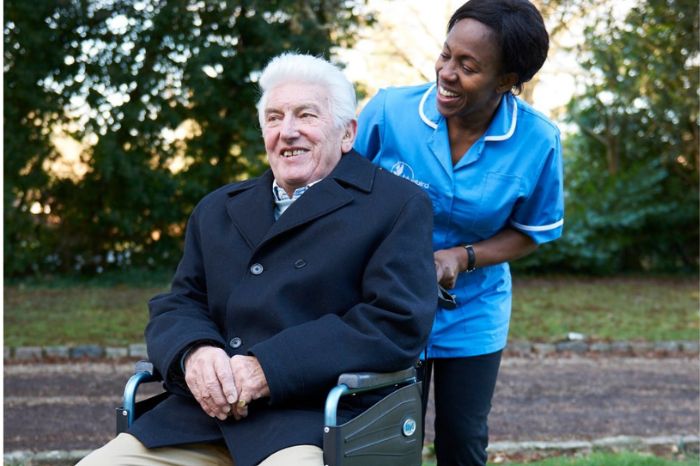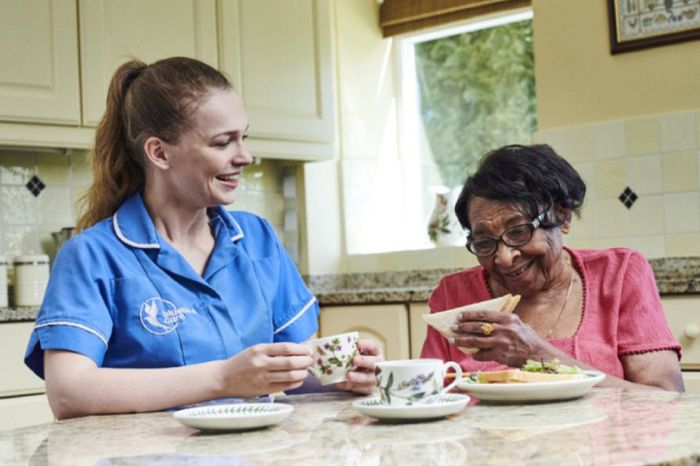What Type of People Work in Care?
Curious about a career in the care industry but not sure if your face would fit? You’d be surprised about the different types of people that work in care!
26/07/2022
Curious about a career in the care industry but not sure if your face would fit? You’d be surprised about the different types of people that work in care!
In this post we’ll talk to Bluebird Care staff to get a feel for the most common types of people that work in care, and some of the less typical types too.
To start with, though, we’ll answer one of the most typical questions we get asked about working in home care…
What kind of person do you need to be to be a carer?
All of the different types of people that work in care have one thing in common: a truly big heart and a kind, caring nature – with bags of patience for people who are a little bit more on the vulnerable side.
“Empathy is really the number one thing we look for when it comes to the qualities of a care assistant,” says Bluebird Care Worthing Director Kat Thomas. “It doesn’t matter if you’re old or young, outgoing or a little quieter, or whether you come from a caring background, a corporate one, or anything in between. As long as you can put others first, you might make an amazing carer.”
Just some of the many different types of social care workers at Bluebird Care
Experienced carers
Perhaps the most common types of people that work in care are those who’ve been doing it for years – and have worked in all kinds of caring environments.
Jackie is one such person. She’s been working in the care industry for over 30 years, and spent many of those in care homes before she moved into home care. She joined us 18 months ago as our Care Assistant Supervisor, working out of the Worthing office in a role that sees her being the main go-to for our carers out in the field.
“I’ve loved every part of my care journey,” says Jackie. “I just love helping people and seeing how much of a difference it makes to them. So working out in the field was always really joyful for me – even where something difficult happens and you have to roll with it!
“The best thing about my current role is using my experience to help our care assistants navigate the challenges they come up against and overcome them. It feels wonderful knowing that everything I’ve achieved I can pass on to the next generation of carers.”

Care career ladder climbers
As someone who has worked her way from care assistant through to an office-based role, Jackie also belongs to the second type of social care workers – those committed to a long career in care where they can climb the career ladder.
She’s not the only one. Our Care Supervisor Lauren is in charge of customer queries and concerns – but she initially started out in the care industry as a care assistant, just like so many others.
“I’ve been working in social care for nine years now,” says Lauren. “I’ve been at Bluebird Care for just over two of those and there’s definitely something special about this place. I love how my experience has been rewarded and I’ve had so many opportunities to learn and support the team.”
“It’s not just office work, either,” she continues. “When needed all of the support staff will go out on care calls – for instance, if there’s an illness and one of our regular carers can’t make it. We really pull together as a team. It’s somewhere I could see myself working and growing for years to come.”
Part-time carers
 When you think about the qualities of a care assistant, words like ‘dedicated’ and ‘committed’ might come to mind. So you’d be forgiven for thinking that it’s not the kind of job you can’t do part-time. However, nothing could be further from the truth!
When you think about the qualities of a care assistant, words like ‘dedicated’ and ‘committed’ might come to mind. So you’d be forgiven for thinking that it’s not the kind of job you can’t do part-time. However, nothing could be further from the truth!
“We have quite a few care assistants who leave to have families and then come back after in a temporary capacity,” says Stuart, our Head of Operations. Also a qualified life coach and hypnotherapist, Stuart understands the way care industry workers sometimes need the job to adapt to life’s challenges.
“We aim to be as flexible as possible with our staff working bank hours,” he says. “They tell us when they’re available and we give them shifts to fit around their lives. It works quite well, especially with those who are returning to care after some time away.”
“However, sometimes we can even offer people who strongly show the qualities of a care assistant a part-time position, including full training and shadow shifts. The care industry urgently needs carers and offering that flexibility can be the difference between someone considering care and looking elsewhere, and giving it a go and discovering how much they love it.”
Sector switchers
Another of the different types of people that work in care are those who switch from an entirely different type of work.
Worthing Care Assistant Kirsty, for instance, was in the corporate world for going on 20 years before she swapped it for life as a Bluebird. She calls care work “Probably the most rewarding job I’ve ever done!”
Kirsty is one of many people at our Worthing branch who have switched sectors to work in the care industry for the love of the job. “We always say that care is less of a job and more of a calling,” says Kat. “We meet a lot of people who are just a bit burned out by the corporate world and want a change. They’re often some of the people who value what we do the most.”

College leavers
The last type of social care workers prove that age really is no barrier when it comes to giving top-quality care to some of society’s most vulnerable people.
“We also see a number of college leavers join us fresh from passing their A-levels,” says Shirley, our Head of Care and Compliance. “Often, they come in with some kind of healthcare or social care qualification, so they’re off to a good start. However, even if not, we offer them a full three-day training course along with 15 modules of e-learning so they’re soon up to speed. Within a week or two they can go from leaving education to shadowing experienced carers and then taking their first steps as a carer themselves on calls out on their own.
“It’s always very rewarding seeing college leavers grow as they go. Whether they stay in care for a few months, a few years, or a lifetime, we know the skills they develop and the experiences they have here will serve them well in every walk of life.”
Thinking about trying social care?
Whether you belong to one of the groups above, or your circumstances are entirely different, if the idea of looking after people appeals to you, there could be a role at Bluebird Care that’s absolutely ideal for you.
To learn more, visit our careers page to see our Worthing Care Assistant jobs or get in touch with us to discuss how a career in care could be the amazing opportunity you didn’t even realise you were looking for.
Related posts
- Five Surprisingly Big Benefits of Working in Social Care
- What’s it Like to Become a Carer?
- Working in Care Homes vs Being A Home Carer
- Why Carers Are Needed Now More Than Ever
- Acts of Kindness: Lauren’s Story

